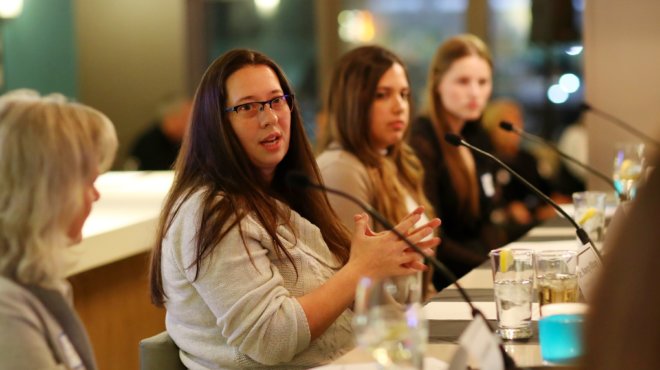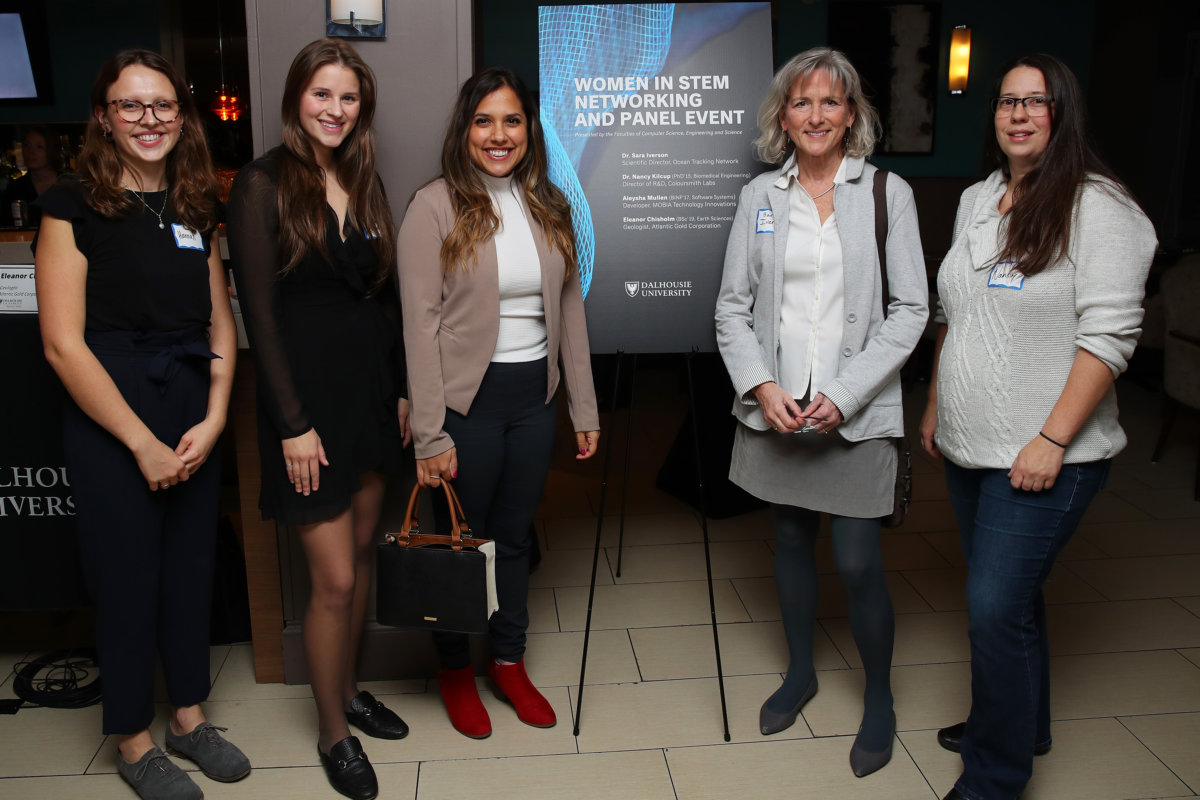
Inspiring females in STEM: Nancy Kilcup (MASc’09, PhD’11)
Nancy Kilcup (MASc’09, PhD’11) remembers when she was pregnant with her first child. She was in her early 20s and still in the process of completing her undergraduate degree in chemistry. She recalls a comment a professor made at the time, stating, “Well, I guess this is the last time we’ll be seeing Nancy.”
Although disappointed by the archaic notion that females were unable to have both successful careers and raise families, Dr. Kilcup went on to complete her undergraduate degree, with honours. From there, she worked for Ocean Nutrition Canada where she developed a strong interest in working with start-up companies. She eventually returned to school to earn a PhD in Biomedical Engineering at Dalhousie University and began working at a local start-up, DMF Medical Inc.
Today, the 39-year-old engineering alumnus is the director of R&D at Coloursmith Labs, Inc., a promising start-up venture set to manufacture specialized optical filters for contact lenses. The lenses will protect people from harmful hazardous blue light.
Dr. Kilcup is also pregnant with her third child.
Her journey, was one of many inspirational stories that were shared on Wednesday evening at Dalhousie’s Women in STEM Panel Event.
The panel
Females from all domains and ages gathered at the Cambridge Suites in Halifax to learn more about the importance of women in fields related to science, technology, engineering and mathematics (STEM). Dalhousie students and alumni mingled and conversed with one another about common interests and received advice and support on how to succeed in their careers. The event featured a panel of four impactful females in STEM careers, each representing the Faculties of Engineering, Science and Computer Science.

The panel included 9L-R): student moderator, Hannah Kaufman: Eleanor Chisholm (BSc’19, Earth Sciences) Geologist, Atlantic Gold Corporation: Aleysha Mullen (BINF’17, Software Systems) Developer, Mobia Technology Innovations: Dr. Sara Iverson, Scientific Director, Ocean Tracking Network: Dr. Nancy Kilcup (PhD’15, Biomedical Engineering), Director of RD, Coloursmith Labs
The underrepresentation of women in STEM has attracted considerable attention in recent years. According to Statistics Canada, in 2016, women made up 23 per cent of engineering, science and technology workers in Canada between the ages of 25 to 64.
Finding opportunities
Speaking openly and candidly about their journey through STEM, each panelist shared insight on the challenges and rewards they’ve faced in their careers. And while striving to achieve success and earning the respect of their peers were top priorities, so was maintaining a healthy work life balance.
For Dr. Kilcup, that means leaving work at 5 p.m. each day to go pick up her 18-month old daughter from daycare. It also means returning to her work projects at 10 p.m. at night.
“Having a work-life balance is important to me, but so is my job,” says Dr. Kilcup. “You need to find out what’s important to you in your career, and you need to have the courage to speak up for yourself.”
And while each panelist shared the same sentiment, their overarching message to the audience was to find the right path in life.
“There are no limits to STEM opportunities. The key is always making decisions that leave doors open. If you can’t find the right opportunity, create one,” says Dr. Kilcup. “I work for a 28-year old entrepreneur, who, 24-months ago launched her business idea on the back of a napkin. She had the guts to see her idea through to the end and these opportunities are open to anyone willing to take them.”
Shifting mindsets
Although it’s no secret that STEM industries are primarily dominated by men, attitudes towards these careers being better suited for males have changed in recent years.
Dr. Kilcup says there is a place for everyone in STEM, whether you’re male, female, of a diverse background, or of a certain religion.

“I love learning new things and working in STEM gave me the gateway to do that,” she says. “But one of the best parts of my career is working on teams filled with many diverse backgrounds. It allows me to look at problems differently and leads to more creative solutions to those problems.”
While females may still end up working on teams built entirely of males, their voices are better heard today than in the past, with many employers now recognizing the value women bring to the table.
Kilcup says when she welcomes her third child in April, life will look very different than it did 18 years ago when she had her first baby.
“There are so many opportunities for women who want to pursue a career in STEM. We, as women in STEM, need to be bold and go after our own dreams and goals where ever that takes us,” she says. “The hurdles we face along the way should be viewed more as opportunities to grow and learn than problems that must be overcome. Hopefully we can then be good mentors to those coming after us and create long-lasting change within the STEM environment.”